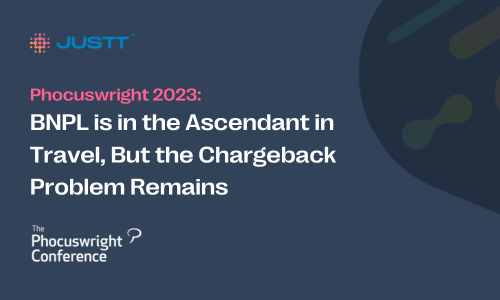Like in other industries, Buy Now, Pay Later (BNPL) was a major topic of discussion at the travel-focused Phocuswright conference in Fort Lauderdale this week. While BNPL has been the talk of the eCommerce space for several years now, the alternative payment method still has plenty of room to grow in the travel industry. According to Justt’s 2023 Chargeback Pulse survey of North American merchants, 42 percent of travel and hospitality merchants offer a BNPL payment option at checkout. Meanwhile, an additional 16 percent of travel and hospitality merchants expect to offer a BNPL option within 12 months’ time. That means a majority of the travel industry in North America will be offering BNPL financing for purchases by the end of 2024.
This dovetails with the increasing adoption of BNPL by consumers, with 53 percent of U.S. consumers saying that they used the alternative payment method in the past 12 months, according to a survey conducted by Justt in May. Merchants are just following the money.
One of those merchants has been Royal Caribbean Group, the cruise ship company, which has been offering short-term installment loans through Affirm on its website checkout since December 2022.
BNPL: A remedy for sticker shock
BNPL is a form of short-term installment payments that have become popular over the last decade in the English speaking world, especially during and after COVID. Leading BNPL brands include Afterpay (now owned by Block), Affirm and Klarna, among many others. Typically, merchants pay higher fees to accept BNPL payments than they do to process credit cards, yet many still love BNPL. The reason for the growing popularity of BNPL was summed up well by Antonio Medina, AVP of eCommerce Operations at Royal Caribbean Group at Phocuswright. “People at some point get sticker shock,” said Medina. He explained that BNPL allows consumers to digest and absorb prices for goods normally out of reach, unlocking what may have seemed unattainable to somebody.
In the travel industry post-pandemic, BNPL plays an important role in unlocking latent demand for travel experiences that were difficult to impossible to experience for a long period of time.
“People are no longer saying when can I do my bucket list, but I want to do my bucket list now,” said Medina. “They want to come to us now. They aren’t going to wait.”
Now, cruise bookings are at their highest levels ever, even exceeding the numbers seen pre-Covid in 2019.
BNPL adoption presents a great opportunity for travel businesses to take advantage of this consumer push for new travel experiences and add incremental revenue to their bottom lines by selling more to people who would otherwise not have the funds available to buy what they want at this specific moment in time.
Sellers beware: BNPL chargeback rates are exceptionally high
However, Just has discovered through its own proprietary research one drawback BNPL presents as a payment method – additional chargeback risk. Among North American merchants who offered BNPL as a payment method, 35% said their BNPL payments experienced a chargeback rate above 1.81 percent and 53% said the chargeback rate exceeded 0.91 percent.
For sake of reference, when a merchant has a chargeback rate over 0.9 percent, they enter the Visa Dispute Monitoring Program where they are subject to additional fees and fines. If they do not exit the program within a year, the merchant risks having their credit card processing rights terminated.
The reason for the higher chargeback rates on BNPL transactions seem to stem from a number of factors:
- The higher likelihood of buyer’s remorse as BNPL users are more likely to spend money they don’t have than traditional consumers.
- A greater chance for opportunistic friendly fraud as spread out installment payments mean a shopper can stop the payment after they received the good or service, but before all the payments have gone through.
- A greater chance of accidental friendly fraud as buyers don’t associate the BNPL name with the travel merchant they remember buying from.
- A lack of coordinated communication and collaboration between the merchant and the BNPL provider could lead to more legitimate chargebacks as there are mishaps in handling fulfillment issues and refunds.
BNPLs moving to shift chargeback liability
For the time being, merchants in travel and other industries don’t have to worry too much about the enhanced risk of BNPL chargebacks, as typically the BNPL provider is the merchant of record who is held liable for the funds reversal. However, some BNPL providers are moving away from this perk by contractually shifting liability for chargebacks to the actual provider of the goods or services (while still maintaining their position as “merchant of record”).
At Justt, we expect this shift in liability to become much more common in the BNPL space as restrictive monetary policy by central banks discourage capital markets from financing BNPL providers’ past growth at all costs strategies. Instead many providers have already shifted focus from growing revenue to profitability, and a reassessment of liability for both true and friendly fraud is expected to be a subject of contractual negotiations.
That said, the growing adoption of BNPL by merchants and consumers at large and in the travel space in particular is expected to continue. The key is analyzing the impact BNPL is having on a business’ transactions and ensuring strong communication and coordination between the loan provider and the merchant in dealing with the overall customer experience.
“You can't just set it and forget it,” said Stacey Paul, Senior Director of Client Success at Affirm during the BNPL session at Phocuswright. “You have to launch it, collect data, see how consumers are behaving, see what loan terms they're adopting. And then it's a constant evolution and a constant optimization of financing programs, placement, marketing, what have you.”
So too, it is with chargeback management and BNPL programs. To make sure legitimate chargebacks are prevented and illegitimate (AKA friendly fraud) chargebacks are mitigated, the BNPL provider has to work with the merchant sharing information from the transaction details to customer service logs. It’s just one more aspect of BNPL that’s not set it and forget it, but actually requires constant upkeep and optimization.
For more information on BNPL adoption by American and Canadian merchants with over $50 million/yr in revenue and the chargeback rates associated with that payment method, download Justt’s 2023 Chargeback Pulse report.









